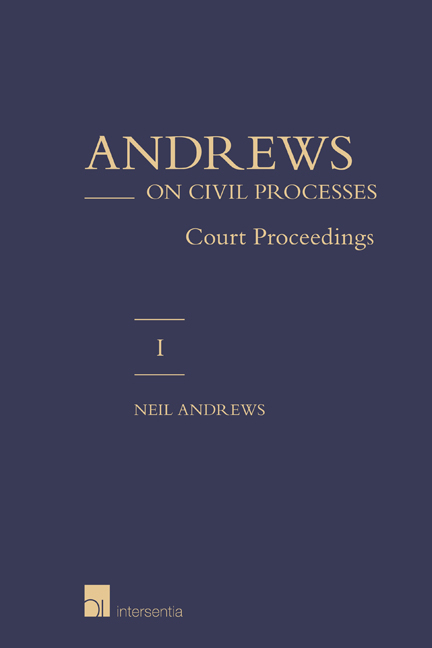Book contents
- Frontmatter
- Dedication
- Epigraph
- Preface
- Contents
- Table of Cases
- Table of Statutes
- Table of Statutory Instruments
- PART I INTRODUCTION TO THE FORMS OF CIVIL JUSTICE
- Chapter 1 Introduction
- Chapter 2 Sources of English Civil Procedure
- Chapter 3 The Big Picture’: Interaction of the Court System and Other Forms of Dispute Resolution
- PART II COMMENCEMENT OF COURT PROCEEDINGS AND PREPARATION FOR TRIAL
- PART III END-GAME: TRIAL, APPEAL, FINALITY AND ENFORCEMENT
- PART IV COSTS AND FINANCING OF LITIGATION
- PART V SPECIAL PROCEEDINGS
- PART VI PRINCIPLES OF CIVIL LITIGATION
- PART VII THE EUROPEAN CONTEXT
- Select Bibliography
- Index to Volumes I and II
Chapter 2 - Sources of English Civil Procedure
from PART I - INTRODUCTION TO THE FORMS OF CIVIL JUSTICE
Published online by Cambridge University Press: 13 December 2017
- Frontmatter
- Dedication
- Epigraph
- Preface
- Contents
- Table of Cases
- Table of Statutes
- Table of Statutory Instruments
- PART I INTRODUCTION TO THE FORMS OF CIVIL JUSTICE
- Chapter 1 Introduction
- Chapter 2 Sources of English Civil Procedure
- Chapter 3 The Big Picture’: Interaction of the Court System and Other Forms of Dispute Resolution
- PART II COMMENCEMENT OF COURT PROCEEDINGS AND PREPARATION FOR TRIAL
- PART III END-GAME: TRIAL, APPEAL, FINALITY AND ENFORCEMENT
- PART IV COSTS AND FINANCING OF LITIGATION
- PART V SPECIAL PROCEEDINGS
- PART VI PRINCIPLES OF CIVIL LITIGATION
- PART VII THE EUROPEAN CONTEXT
- Select Bibliography
- Index to Volumes I and II
Summary
INTRODUCTION
The sources of English civil procedure are: (i) primary legislation; (ii) statutory instruments (notably the Civil Procedure Rules – ‘CPR (1998)’); (iii) practice directions (or ‘practice statements’ or ‘practice notes’); (iv) pre-action protocols (on which 5.02 ff); (v) judicial decisions; (vi) court guides to practice (the Chancery Guide, Queen's Bench Guide and the Admiralty and Commercial Court Guide) (these guides supply detail, for example, on the topic of ‘skeleton arguments’, 14.11); and (vii) the inherent jurisdiction (for example, 25.21 concerning vexatious litigation). The author examined these in detail in 2003, and, for reasons of space, it is not possible to recite all these details in this new work. It will be enough to draw out some specific points here.
The ‘six phases of English civil proceedings’ are examined in detail in Chapter 4.
PRIMARY LEGISLATION
Some procedural rules are founded upon primary legislation. Examples are: (i) the Divisions of the High Court; (ii) the power to issue injunctions;(iii) the rule that proceedings must normally take place in public; (iv) the rules of limitation of actions; (v) the legislative power to issue procedural rules governing the county courts, High Court, and Court of Appeal; (vi) introduction and refinement of conditional fee agreements; (vii) abolition of the judicial capacity of the House of Lords and introduction of the United Kingdom Supreme Court.
STATUTORY INSTRUMENTS: CPR (1998) AND THE RULE COMMITTEE
The CPR are by far the largest source of procedural rules. Before the CPR (implemented 26 April 1999), there were separate sets of rules: the Rules of the Supreme Court (‘RSC’) dealing with matters in the High Court and Court of Appeal, and the County Courts Rules (‘CCR’) concerning county court litigation. The CPR code, however, has unified the rules applicable to the High Court and to the county courts, as well as the Court of Appeal. The United Kingdom Supreme Court is governed by its own special practice rules. There is also a separate set of rules for family proceedings. The CPR code was drafted by the Rule Committee, which replaced the former separate rules committees responsible for the RSC and CCR.
- Type
- Chapter
- Information
- Andrews on Civil ProcessesCourt Proceedings, pp. 31 - 42Publisher: IntersentiaPrint publication year: 2013
- 6
- Cited by

